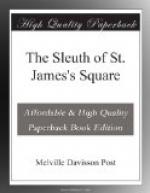“To-morrow,” the heavenly creature had said softly, like a caress, in the woman’s ear when an attendant had taken her through the little door into the empty box. But the to-morrow broke with every illusion vanished.
The woman sat beside her husband in the dismal court-room when the court convened. The judge, old and tired, was on the bench. A sulphurous, depressing fog entered from the city. The court-room smelled of a cleaner’s mop. The jury entered; and a few spectators, who looked as though they might have spent the night on the benches of the park out, side, drifted in. The attorneys and the officials of the court were present and the trial resumed.
Every detail of the departed, evening was, to the woman, a mirage except the brutal threat of the attorney, uttered before she had gone down into the street. This threat, with that power of reality which evil things seem always to possess, now materialized. After the court had opened, but before the trial could proceed, the attorney for the defendant rose and addressed the court.
He spoke for some moments, handling his innuendoes with skill. His intent was to withdraw from the case. He realized that this was an unusual procedure and that the course must be justified upon a high ethical plane. He was a person of acumen and of no inconsiderable skill and he succeeded. Without making any direct charge, and disclaiming any intent to prejudice the prisoner and his defense, or to deprive him of any safeguard of the law, he was able to convey the impression that he had been misled in undertaking the defense of the case; that his confidence in the innocence of the accused had been removed by unquestionable evidence which he had been led to believe did not exist.
He made this explanation with profound regret. But he felt that, having been induced to undertake the defense by representations not justified in fact, and by an impression of the nature of the case which developments in the court-room had not confirmed, he had the right to step aside out of an equivocal position. He wished to do this without injury to the prisoner and while there was yet an opportunity for him to obtain other counsel. The whole tenor of the speech was the right to be relieved from the obligation of an error; an error that had involved him unwittingly by reason of assurances which the developments of the case had now set aside. And through it all there was the manifest wish to do the prisoner no vestige of injury.
After this speech of his attorney the conviction of the man was inevitable. He sat stooped over, his back bent, his head down, his thin hands aimlessly in his lap like one who has come to the end of all things; like one who no longer makes any effort against a destiny determined on his ruin.




